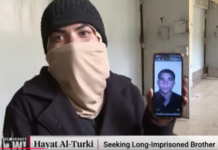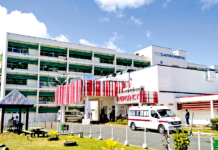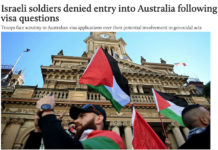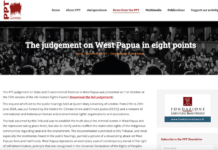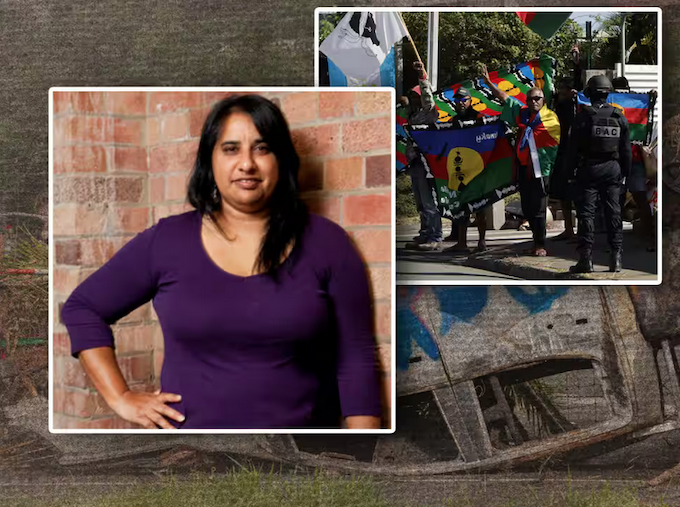
“In the aftermath of the ‘No’ denying an Indigenous Voice to Parliament in Australia, I deeply sympathise with the Kanak people’s frustration, fear, and anger at being outvoted and dismissed,” writes Angelina Hurley.
COMMENTARY: By Angelina Hurley
After the trauma of completing a PhD on decolonising Australian humour, I needed a well-deserved break.
I always avoid places with throngs of patriotic Aussies, so I chose Nouméa, in New Caledonia, over Bali, settling on a small outer island.
One night, a smoke alarm jolted me awake. I went to the balcony and smelled smoke, seeing fires and smoke clouds from the mainland. The next morning, I learned from the only English-speaking news channel that riots had erupted there.
- READ MORE: Media fuss over stranded tourists, but Kanaks face existential struggle
- ‘France lost the plot’ – journalist David Robie on Kanaky New Caledonia riots
- EXPLAINER: Why are Indigenous Kanak people protesting in New Caledonia?
- Hello, I’m white (and privileged) – 10 things you should know
- Other Kanaky New Caledonia reports
Protests against French control of New Caledonia have resulted in seven dead — five Kanaks, and two police officers (one by accodent) — and a state of emergency
I woke to a fleet of sailboats, houseboats, and catamarans anchoring near the island, ready to offer a quick escape for the rich (funny how the privileged are always the first to leave before things are handed back to them on return).
Travelling from hotel to hotel, I reached a quiet and desolate Nouméa in the late afternoon. Finding transport was difficult, but a kind French taxi driver picked me up, and we bypassed barricaded streets.
At the hotel, an atmosphere of anxiety and confusion lingered among tourists and staff, although I felt safe.
The staff worked tirelessly, maintaining normalcy while locals lined up for food outside supermarkets. With reports of deaths, I constantly scanned the internet for news from both French and Kanak perspectives. As days passed, the Aussie tourist twang grew louder and more restless.
Amusing, strange, disappointing: the reactions of the privileged
The airport closed, and flights were cancelled indefinitely, fuelling frustration among Australians (and New Zealanders) who couldn’t access the consulate.
Australian government representatives eventually arrived to update us on the situation, leading to a surge of complaints.
Despite concerns about being stuck, I didn’t feel significantly inconvenienced beyond travel delays and added expenses. We were being well taken care of.
Not everyone agreed. Some found the answers insufficient.
The reactions of the privileged are amusing, strange, and disappointing: while anxiety about the unknown is understandable, some people need to get a grip.
Complaints poured in about the lack of access to information from Australia, despite the State of Emergency. There were debates and demands for updates via text (sorry, Gill Scott Heron, this revolution will be broadcast on WhatsApp).
It was amusing to hear people discussing social media information sharing while claiming lack of access, despite the readily available internet, English news on TV, and information from hotel staff.
As I listened, I humorously observed the gradual rise of White Aussie Privilege.
Their perception of disadvantage was very different to mine: an elderly migaloo woman requested daily personal phone updates to her room, while boomers threw tantrums over not being called on quickly enough.
There’s always the outspoken sheila, interrupting whenever she feels like it, and the experts proclaiming knowledge exceeding that of all the officials.
A rude collective sigh followed a man’s inquiry about the wellbeing of those handling the crisis outside, with someone retorting, ‘It’s their bloody job.’
The highlight was GI Joe informing the French, as if they didn’t know, of the presence of a helicopter pad attached to the hotel, angrily suggesting Chinook helicopters from Townsville should evacuate everyone.
What?! I burst out laughing, but no one seemed to find it as hilarious as I did.
The irony eluded him: the helicopters, named after the Chinook people, a Native American tribe Indigenous to the Pacific Northwest USA, would have First Nations saviours flying in to rescue the Straylians.
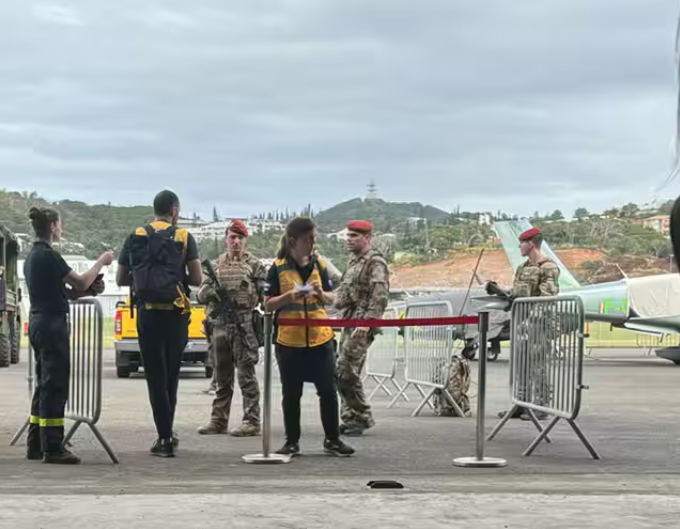
Despite the severity of the emergency situation, white travellers still found cause to complain about a lack of WhatsApp updates.
The Australian consulate rep patiently reminded everyone of the serious State of Emergency, with lives lost and the focus on safety and unblocking roads, making our evacuation less of a priority for the French at that time.
When crises hit, White people often react uncomfortably towards the only Black person in the room (which I was, besides an African couple).
They either look at you suspiciously, avoid eye contact, ignore you, or become overly ally-friendly.
The White Aussie Privilege resembled narcissistic behaviour — the selfishness, lack of empathy, and entitlement was gross.
The First Nations struggle around the world
Sitting safely in the hotel, the juxtaposition as an Indigenous person felt bizarre.
This isn’t my first such travel experience; I’ve been the bystander before in North America, Mexico, Belize, South America, South Africa, and India.
As a First Nations traveller, I’m always aware of the First Nations situation wherever I go.
Recently, the French National Assembly adopted a bill expanding voting rights for newer residents of Kanaky (New Caledonia), primarily French nationals.
It’s a move likely to further disenfranchise the Kanak people, impacting local political representation and future decolonisation discussions.
At least at home, we have representation in the government.
There are currently no representatives from Kanaky New Caledonia sitting in the French National Assembly.
No consultation with the First Nations people took place (sounds familiar).
In 1998, the Nouméa Accord was established between French authorities and the local government to transition towards greater independence and self-governance while respecting Kanak Indigenous rights.
Since 2018, three referendums on independence have been held, with the latest in 2021 boycotted by Indigenous voters due to the covid-19 pandemic’s impact on Kanaks.
With the Accord now lapsed, there is no clear process for continuing the decolonisation efforts.
As stated by Amnesty International (Schuetze, 2024), “The response must be understood through the lens of a stalled decolonisation process, racial inequality, and the longstanding, peacefully expressed demands of the Indigenous Kanak people for self-determination.”
An all-too familiar story
Relaying the story back to mob in Australia, conversations often turn to the behaviour of the colonisers.
We compare our predominantly passive and conciliatory approach as Aboriginal and Torres Strait Islander people, offering the hand of reconciliation only to be slapped away.
Despite not promoting violence, we note the irony of colonisers condoning violence as retaliation, considering it was their primary tactic during invasion.
As my cousin aptly put it, “French hypocrisy. So much for a nation that modelled itself on a revolution against an oppressive monarchy, now undermining local democracy and self-determination for First Nations people.”
After the overwhelming “No” vote denying an Indigenous Voice to Parliament in Australia, following decades of tireless campaigning by Aboriginal and Torres Strait Islander Peoples, I deeply sympathise with the Kanak people’s frustration, fear, and anger at being outvoted and dismissed.
In French Polynesia, there are both movements for and against decolonisation.
As I sit amid this beautiful place, observing locals on the beaches and tourists enjoying their luxuries, I know things will return to the settler norm of control — and First Nations people are told they should be grateful.
Angelina Hurley is a Gooreng Gooreng, Mununjali, Birriah, and Gamilaraay writer from Meanjin Brisbane, a Fulbright Scholar and recent PhD graduate from Griffith University’s Film School. This article was first published by NITV (National Indigenous Television).



